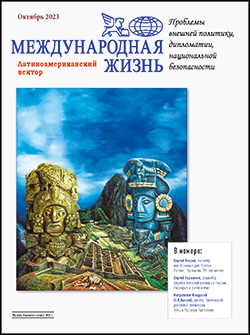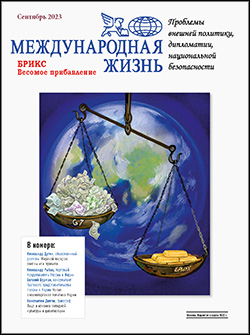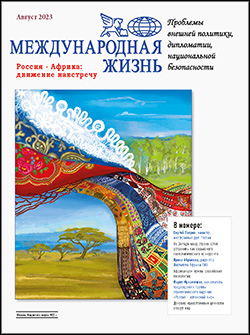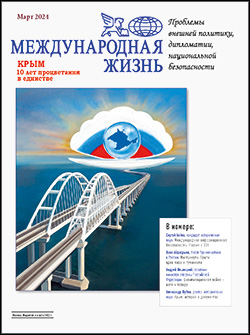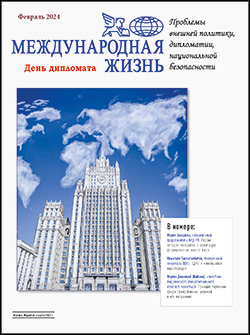CONFERENCE OF AMBASSADORS
V. Putin
President of the Russian Federation
Address to the Conference of Ambassadors and Permanent Diplomatic Envoys of the Russian Federation
Discussions on the Sidelines
P. Akopov
On Russia and the World
A. Denisov
The Russian-Chinese Relations as a Clear Success Story
V. Churkin
On the UN Security Council
A. Grushko
On Russia, the EU, and NATO
T. Afanasyev
On Japan
O. Ozerov
On the Middle East
K. Vnukov
On Korea
V. Vorob'ev
On Korea
A. Veshnyakov
On the Baltic Region
B. Bolotin
On the Arab East
M. Kamynin
Russia and Cuba: Natural Allies in the Struggle for Media Multipolarity
The scandal, which erupted recently as the Zunzuneo social media project invented by the US Department of State to target the young Cuban audience went under, highlighted the threat of the use of IT as means of destabilization and the need for joint responses to the problem
V. Lukov
A Symbol of the Multipolar World
The July, 2014 BRICS summit convened in Fortaleza, Brazil, the slogan being "Inclusive growth: sustainable solutions". Naturally, the debates at the forum largely revolved around international affairs. The summit also discussed the themes of Contingent Reserve Arrangement (CRA) and the New Development Bank (NBD).
I. Lyakin-Frolov
Russia-Tajikistan: Friendship and Strategic Partnership
It is fair to say that, as of today, the dynamics of the Russian-Tajik relations is positive. The picture has improved markedly compared to what we saw since the late 2012 till the fall of 2013, the period when an extremely important but intricate deal on the Russian military presence in Tajikistan was in the making
POLITICS
R. Dzarasov
The US Foreign-Policy Strategy in the Five-Day Was in the South Caucasus
The snap developments which brought the Crimea into Russia left no doubt that at the moment Russia's readiness to rise to the challenges posed by the West is at a level unprecedented since the end of the Cold War. The fact came as a major surprise to the US Administration, but it should be borne in mind that Russia took the risk of a serious confrontation with the West for the first time already six years ago, in 2008, in the course of the Caucasus' Five-Day War
A. Lukin
The Concept of the Silky Way Economic Area and the Eurasian Integration
Speaking at the Nazarbayev University in Astana, Kazakhstan, Chinese leader Xi Jinping expressed an idea of creating a Silky Way economic area as a new form the the economic cooperation between China, Central Asia, and Russia. Various aspects of the plan are currently being looked into seriously in China and in other countries
O. Il'shev
2016 The Congo Presidential Elections: Influenced by External Factors
Terrible genocide against Tutsi in Rwanda took place two decades ago. The three-month killing spree perpetrated by the Hutu, with the background of de facto inaction on behalf of the UN and key international players, more than just defined the future of Rwanda. Consequences of the genocide affected the wider region - the Great Lakes area and, especially, the neighboring Zaire which adopted the name of the Democratic Republic of the Congo in May, 1997
A. Oganesyan
From the Diary of Editor-in-Chief
With the events in Ukraine unfolding, reflections, associations, glimpses of historical parallels relevant to what may be seen in the context as a civilization challenge are to be found in the diary
Birthday Congratulations to A.L. Fedotov
THE UKRAINIAN DIRECTION
A. Manoylo
Role of Chaos Control Strategies in Ukraine's Political Crisis
Now that the truce has expired and the east of Ukraine faces a new round of the Kyiv administration's punitive strikes, it becomes increasingly clear who is actually in control in the present-day Ukraine, who got the power in the 2014 coup d'etat and how the authority was split among the winners in its wake. On the whole, the real authority in Ukraine appears to be concentrated in three decision-making centers which, accordingly, function as three layers of control over the Ukrainian territory where normal statehood has simply stopped to exist
A. Moiseev
On the Responsibility of the Parties to the Conflict in Ukraine
It was announced on June 25, 2014 that the Red Cross had recognized the rebels in south-eastern Ukraine as a party to the conflict. The act of recognition sends a signal to the international community to the effect that the Red Cross reads the conflict as internal rather than international in terms of the international law
BOOKS AND REVIEWS
B. Pyadyshev
International Law From A to Z
V. Bushuev
Energy and Geopolitics
K. Dolgov
Russia and China: Strategic Partnership
A. Dubina
Russia and the Muslim World: Looking into the Future
IN RUSSIA'S MINISTRY OF FOREIGN AFFAIRS
I. Khalevinskiy
On the Meeting of the Presidium of the Association of Russian Diplomats
IN MEMORIAM
A. Torkunov
Commemorating N. Bazhanova
EYEWITNESS ACCOUNTS
A. Davydenko
Bulgaria – Russia: the Past, the Present, and the Future
Читайте другие материалы журнала «Международная жизнь» на нашем канале Яндекс.Дзен.
Подписывайтесь на наш Telegram – канал: https://t.me/interaffairs

 00:52 09.08.2014 •
00:52 09.08.2014 • 